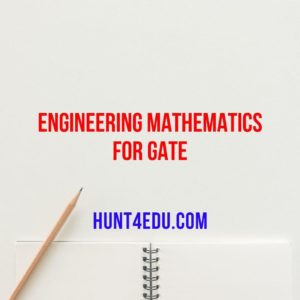Engineering mathematics is one of the compulsory subjects in GATE with a high weightage. Check out the topic-wise strategy to organize for engineering mathematics in the GATE exam 2020 slated to be persisted February 1, 2, 8 and 9 next year.
 Engineering Mathematics holds key relevance in the Graduate Aptitude Test in Engineering 2020 (GATE 2020) as the weightage given to this subject has been consistent over the years. Every year the weightage of this subject ranges between 12 and 15 marks. Engineering Mathematics, a wide subject covered in over four to five semesters during college time, needs a strategic preparation plan. The key to prepare for this subject is to make short notes and keep them handy with you or have a Formula Sheet so that you can look up to a concept whenever you need it.
Engineering Mathematics holds key relevance in the Graduate Aptitude Test in Engineering 2020 (GATE 2020) as the weightage given to this subject has been consistent over the years. Every year the weightage of this subject ranges between 12 and 15 marks. Engineering Mathematics, a wide subject covered in over four to five semesters during college time, needs a strategic preparation plan. The key to prepare for this subject is to make short notes and keep them handy with you or have a Formula Sheet so that you can look up to a concept whenever you need it.
Know how to prepare for engineering mathematics in the GATE exam 2020.
Take a look at the topic-wise strategy to prepare for engineering mathematics in the GATE exam.
Linear Algebra
While preparing for algebra, the main target must get on Eigenvalue Problems and also the algebra as almost every-time there’ll be an issue from either of those two topics. One must also remember the properties of eigenvalues just like the relation between eigenvalues of two matrices which are inverse of every other and other similar properties. No got to become involved within the basis vectors and span of basis vectors to make an n-dimensional space as those concepts are unnecessary for GATE.
BOOK INFO
BOOK NAME – ENGINEERING MATHEMATIC FOR GATE
AUTHOR – DISHA PUBLICATION
SIZE – 28.1MB
PAGES – 134
Calculus
Calculus can be divided into three categories:
- Differential Calculus: It involves basic concepts of Limits, derivatives and application of derivatives like Increasing, Decreasing function and Maxima and Minima problems.
- Integral Calculus: It involves indefinite and integral and therefore the properties of definite integrals. Also, you would like to be alright versed with the concepts of multiple integrals like Double and Triple Integral and also Line, Surface, and Volume Integrals.
- Vector Calculus: It involves Gradient, Divergence and Curl and Vector Integral Theorems (Green’s, Gauss’s and Stokes Theorem) and there are lot many properties of every concept and you want to remember all those to unravel the issues faster like divergence of the curl is usually zero, believe me, that these properties do are available handy within the exam.
Differential Equations
There aren’t many concepts within the equation s as you’ll always check the answer by satisfying each option within the differential equation given within the problem statement but at an equivalent time do remember some special differential equations like Bernoulli’s Equation and Euler equation.
Also, within the latest years questions supported the existence of solution and uniqueness theorem are seen so that they also got to be prepared.
Complex Functions
It is the littlest topic among all topics from Engineering Mathematics and therefore the only important concepts are Cauchy-Riemann Equations for Analytic Functions and Residue Method of Integration and remainder of the topics are not necessary for GATE.
Probability and Statistics
The general problems involving Probability are often prepped up by practice and there’s no got to study much about them but you’ll always remember Baye’s Theorem, more focus should get on Random Variables like Poisson’s Distribution and other distributions. Statistics is additionally vital and you want to remember to mean, median and mode concepts also as the coefficient of co-relation, so do make short notes for each of these concepts.
The pre-requisite for probability is Permutation and Combination which you would like a basic idea about and not up to JEE level.
Numerical Methods
Two things are important during this section one is that the equation solving by methods like Newton-Raphson and Bisection Method and other is that the Numerical Integration technique by methods like Trapezoidal Rule and Simpson’s rule so do cram the formulas for each of those methods and observe the use of Calculator such as you can form equations within the sort of answer of the previous step so that recursion becomes faster and more accurate.
Transform Theory
This chapter is just included in the EEE and ECE GATE curriculum and it includes Laplace, Fourier, and Z-Transform. They can be better prepared from Signals and Systems book like Oppenheim and Wilsky.
So, the key to tackling such a large subject is to narrow down the course content to the most relevant topics and cut-out the unnecessary topics otherwise your workload will increase but not your performance.
SOURCE:- TELEGRAM CHANNEL (PDFBASKET)
BE AWARE: HUNT4EDU.COM does no longer owns this book neither created nor scanned. We simply offer the hyperlink already to be had on the internet. If any manner it violates the law or has any troubles then kindly mail us or Contact Us for this(hyperlink removal).
We don’t aid piracy this duplicate grows to be supplied for university youngsters who’re financially bad but deserve greater to examine. Thank you.
Download Your Book
SCRIBD Free Access for 30 Days
Meritnation Free Live Class For 21 Days Due to CORONA Lockdown
CORONA EFFECT: Free access to BYJUS learning program until April-end
TOP BOOKS FOR ENGINEERING STUDENT TO MUST READ
